Thoughts on a Man, a Writer, and a Friend – Paul Reid
Published 2:15 pm Friday, March 7, 2025
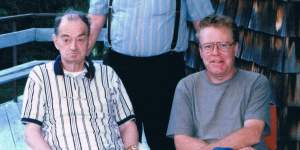
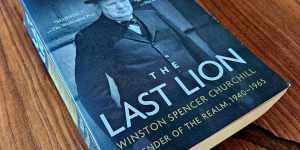
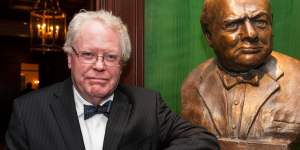



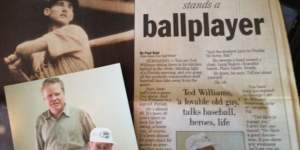
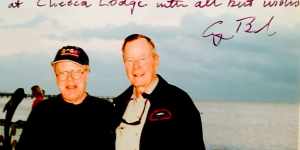

|
Getting your Trinity Audio player ready...
|
I’ve spent nearly two decades in Tryon and immersed myself in various facets of the community. I’ve had the privilege of meeting numerous nationally recognized illustrators, actors, poets, and musicians. Tryon felt like a sponge, saturated with talent seeping from every pore. As I built friendships with these individuals, I accumulated a wealth of exceptionally talented connections. I thought my bank of acquaintances could hold little more—until one day, I was introduced to a man in a dark green felt fedora, seated at the table next to me at our local wine bar, the Tryon Bottle, on Trade Street. He was smoking a cigarette and nursing a glass of red wine—Chianti, as it turned out.
Somehow, I learned that this intriguing individual was a best-selling author—the writer of the acclaimed Churchill biography The Last Lion: Defender of the Realm, 1940–1965. Many might have simply tipped their hat to the man and moved away from his cigarette smoke, but not me. I was captivated. His name is Paul Reid. For the past few years, I had been absorbing every book, article, documentary, and piece of writing on World War II, treasuring all I learned. At night, I would sit in bed by my lamp, reading an old, moldy copy of Mein Kampf.
As a writer myself, the more I studied World War II—and especially Adolf Hitler—the more I wanted to learn. I was also fascinated by the fact that most people of my generation and younger have little knowledge of World War II, Hitler, the man who started the war, and Winston Churchill, arguably the most important figure in bringing the war to an end.
Trending
Suddenly, here I was, friends with a local man in our little town of Tryon who happened to be one of the world’s foremost experts on not only Winston Churchill but also World War II. I am proud to say that I was given a signed copy of The Last Lion: Defender of the Realm, 1940–1965, which spans 1,183 pages. Reading it was no small endeavor.
The book is deeply detailed, covering all aspects of Churchill—from his wife, Clementine, and his children to his character and political decisions. This volume in the series begins just before World War II when Churchill was in his mid-60s.
Each chapter moves through the war in remarkable detail, often on a near-daily basis, covering not only the war’s progression but also Churchill’s interactions with almost everyone he encountered. His direct, firm, and often frustrating relationship with Franklin D. Roosevelt is well documented, and it becomes clear that if not for Churchill’s persistence, the United States might never have entered the war when it did.
At times, the sheer depth of information can be overwhelming. Yet other moments left me laughing out loud, as the book reveals Churchill’s remarkable humor. He was a man full of life, indulgence, wit, and defiance—known for his love of cigars, alcohol, and extravagant meals, all while leading Britain through its darkest hour.
Hitler, Stalin, Roosevelt, and the other key players on the chessboard of World War II had met their match in Churchill—a man who thrived on both war and diplomacy. In my opinion, if Churchill had been an evil man instead of one determined to achieve peace and end the war, he might have been utterly unstoppable.
Paul was a speaker and panelist at the Tryon International Film Festival twice. Perhaps not a common feature for most film festivals, but as a writer, I felt it was necessary to highlight those who create the stories behind films—whether full-length features, historical fiction, or documentaries.
Trending
We discussed the writing process, strengthening the literary mind, fact-checking, readability and, most importantly for me, maintaining a steady flow of inspiration. For me, writing a book takes at least three to five years; for Paul, it was a daily process spanning more than eight years. I needed to understand that level of commitment.
Paul once said, “I had fancies of being a ‘writer,’ so in my late 30s, I sold my half of the steam valve company I co-owned with my brother. I knew if writing didn’t work out, I’d have a nest egg to take my family forward for years.” He transitioned from business into journalism with confidence but also with an acute understanding of the risks.
So, who is Paul Reid, this man in our small town of Tryon? Here is a snapshot:
He is a journalist, author and historian known for his dedication to telling the stories of history’s most significant figures and events. His career, spanning decades, has taken him from manufacturing to Harvard, from war zones to presidential campaigns, and from local newspapers to the New York Times bestseller list. His ability to connect with people—whether world leaders or ordinary citizens—has set him apart as a writer who captures the essence of his subjects without personal bias.
Reid’s journey began in manufacturing before he pivoted to journalism, earning his bachelor’s degree from Harvard Extension School in 1990. He then spent a decade as a feature writer for The Palm Beach Post, developing a reputation for in-depth, compelling reporting. Throughout his career, he amassed more than 1,000 bylines in major publications, including The Boston Globe, covering stories that spanned local interest to global affairs. His work earned him Cox Newspapers Writer of the Year award twice in six years, a significant achievement given Cox’s extensive reach in cities such as Austin, Atlanta, Dayton, Palm Beach, and Orlando.
Reid reported from some of the world’s most volatile regions, covering wars in Colombia, Yugoslavia, Northern Ireland, and Iraq. “I went to Colombia after an old friend, an FBI agent in counter-terrorism, put me in touch with federal agents there. I was embedded with the Colombian National Police and did three or four stories about the hunt for Pablo Escobar, the paramilitaries, and the drug trade.” His ability to navigate these conflict zones and present stories with clarity and depth solidified his reputation as a fearless journalist.
In 2003, renowned historian William Manchester, struggling with health issues after suffering two strokes and losing his wife, asked Reid to complete the third volume of The Last Lion biography series, Defender of the Realm, 1940–1965. The two had developed a friendship after Reid met Manchester at his home in Middletown, Connecticut. Reid accepted the monumental task and spent the next eight years completing the book, which was published in 2012.
The biography became a New York Times bestseller, reaching No. 6 on the list and remaining in the top 10 for nine weeks. The Wall Street Journal named it one of the best books of the year. It was a defining achievement in Reid’s career, cementing his status as a respected historian.
After decades in journalism and about to start his Churchill biography, Reid settled in Tryon, North Carolina. He is often found at a café chair right next to mine. There, he might reflect—if asked—on his career and the many extraordinary individuals he has encountered. His contributions to literature and journalism, particularly his completion of The Last Lion, have left a lasting impact on historical storytelling and reporting.
But more than anything, becoming friends with Paul was a tremendous deposit into my bank of friendships.














